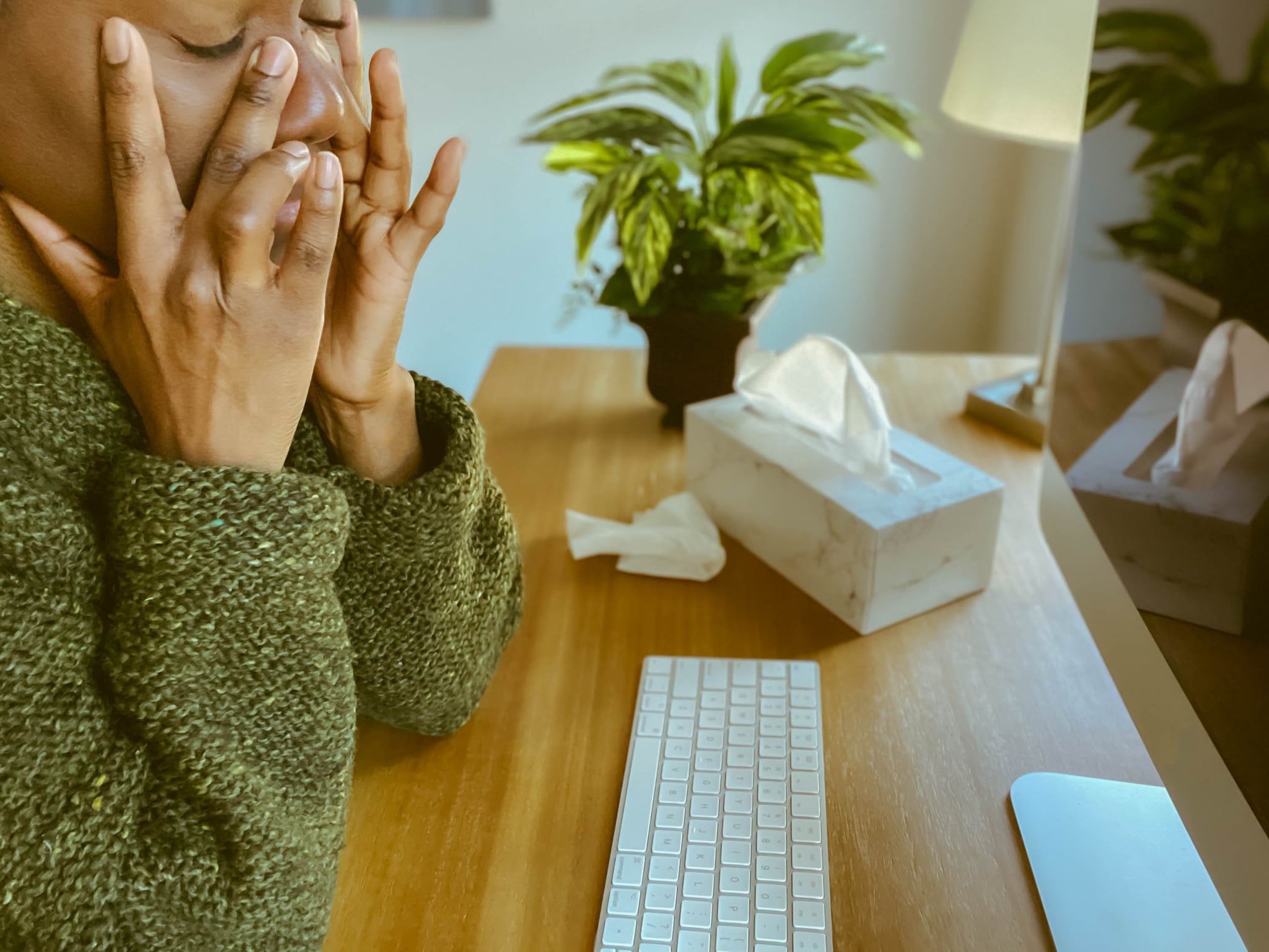
No one’s thrilled to get sick, but there’s something extra cruddy about a sinus infection. The pain, the pressure, the congestion, ugh! If you’re dealing with these symptoms right now, you’re probably wondering, how long does a sinus infection last anyway?
A sinus infection, also known as sinusitis, occurs when the air cavities around your nasal passages become inflamed and blocked with mucus, says Aaron Fletcher, MD, an otolaryngologist, head and neck surgeon, and owner of the Georgia Center for Ear, Nose, Throat, and Facial Plastic Surgery. There are two of these air cavities in your forehead (frontal sinuses), several between your eyes and behind your nose (ethmoid sinuses), and two in your cheeks (maxillary sinuses), adds Glen Porter, MD, an otolaryngologist at Intermountain Health.
The most common cause of a sinus infection is a virus, but they can also be triggered by bacteria, fungi, a foreign object, or environmental factors like allergens, says Clarissa Ortiz, MD, a primary care physician for Inspira Medical Group.
Unfortunately, a sinus infection can be pretty unpleasant and typically presents with facial pain or pressure, post-nasal drip, loss of taste or smell, green or yellow nasal discharge, and nasal congestion, Dr. Porter says. Facial pain may be exacerbated by bending forward or coughing, and some people also experience fever, cough, fatigue, ear pressure, jaw pain, or headaches, Dr. Ortiz adds.
But how long are sinus infections contagious? And are sinus infections contagious through kissing? Here’s what experts told POPSUGAR.
How Long Does a Sinus Infection Last?
Most acute sinus infections (those lasting less than four weeks in duration) last between seven and 10 days, though some cases may resolve in as little as three to five days, Dr. Fletcher says. A sinus infection becomes chronic when it lasts for more than 12 weeks with recurring episodes, he adds.
The length of a sinus infection also depends on the cause, Dr. Ortiz says. “If caused by a virus, symptoms usually last about the same time it takes a virus to run its course, which is about seven to 10 days on average, but if caused by environmental factors symptoms may last well over 12 weeks.”
How Long Are Sinus Infections Contagious?
Here’s where things get a little tricky. A sinus infection itself isn’t contagious, but the cause of your infection could be. For example, if the sinus infection was caused by influenza, you can pass on the influenza virus but not necessarily the sinus infection. And then, your flu symptoms would be contagious anywhere between five to seven days after becoming sick, per the Centers for Disease Control and Prevention (CDC).
So basically, if a virus causes your sinus infection, you can pass on that virus to someone else through coughing, sneezing, kissing, or close contact, but that doesn’t mean you directly transmit the sinusitis itself, Dr. Fletcher explains.
Are Sinus Infections Contagious Through Kissing?
No. Sinus infections are not contagious through kissing, Dr. Ortiz says.
That said, kissing someone with a contagious virus or bacteria can increase your risk of catching the same bug, potentially leading to, or developing into a sinus infection, Dr. Fletcher adds.
Viral vs. Bacterial Sinus Infection
To break things down a bit more, there are two types of sinus infections: viral and bacterial. “The difference would be in the causative agent and possibly the course of illness,” Dr. Ortiz says. “Most viral infections self-resolve within 10 days, but lingering or worsening symptoms past 10 days is more suggestive of a bacterial component at play.”
A viral sinus infection is more common, presents with milder symptoms, and is not treated with antibiotics, while a bacterial sinus infection is rarer, presents with more severe symptoms, and is typically treated with antibiotics, Dr. Fletcher says. Neither type of sinus infection is inherently contagious, but the causative virus or bacteria is what can spread from person to person, he explains.
To determine the type of sinus infection, your doctor will consider the duration, severity, and associated symptoms, but a nasal swab or sinus culture may be necessary to confirm a bacterial infection, Dr. Fletcher says.
How Long Is a Sinus Infection Contagious After Starting Antibiotics?
Sinus infections are generally not contagious, but if the infection requires antibiotics — meaning it’s caused a bacteria — the chance of spreading the underlying cause is reduced within 48 hours after starting treatment, Dr. Ortiz says.
Is It Best to Stay Home With a Sinus Infection?
Good news! You do not need to stay home with a sinus infection, Dr. Porter says. “You should stay home only if you are feeling so poorly that you wouldn’t be productive at work,” he explains. “If you can control your symptoms with over-the-counter medication you can go to work or school.”
With that being said, if your sinus infection presents with additional cold- or flu-like symptoms, consider staying home to prevent the risk of spreading the infection to other people, Dr. Fletcher says.
How to Treat a Sinus Infection
To rid away a sinus infection, Dr. Fletcher recommends the following over-the-counter treatments:
Pain Relievers: Over-the-counter pain relievers like ibuprofen or acetaminophen can help manage pain and fever.
Decongestants: Nasal sprays or decongestant tablets can help open nasal passages and relieve congestion. Just limit the use of all decongestants to three to five days.
Humidifiers: Adding moisture to the air can loosen mucus and ease congestion, but a hot, steamy shower can also do the trick.
Warm Compress: Applying a warm compress to your face can help relieve sinus pain and pressure.
It’s also important to stay hydrated, avoid touching your nose and eyes, practice thorough hand washing, and cover any coughs or sneezes, Dr. Porter says. If symptoms worsen or persist for more than 10 days, or include high fever, severe facial pain, or vision changes, schedule a visit with your doctor, Dr. Fletcher adds. Complications are rare, but an early diagnosis and treatment can squash the issue ASAP.
